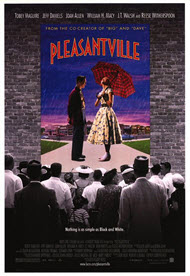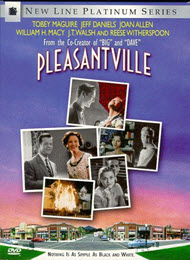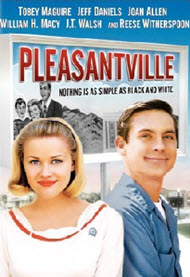Pleasantville
 for some thematic elements emphasizing sexuality, and for language.
for some thematic elements emphasizing sexuality, and for language.
Reviewed by: Dave Rettig
CONTRIBUTOR
| Moral Rating: | Very Offensive |
| Moviemaking Quality: |
|
| Primary Audience: | Teens Adults |
| Genre: | Comedy |
| Length: | 1 hr. 56 min. |
| Year of Release: | 1998 |
| USA Release: |
| Featuring |
|---|
| Tobey Maguire, Jeff Daniels, Joan Allen, William H. Macy, J.T. Walsh, Reese Witherspoon |
| Director |
|
Gary Ross |
| Producer |
| Distributor |
“Pleasantville” is more than a television program for David (Tobey Maguire); it is a passion—an obsession and a means of escape from the fatalism of his generation. “Pleasantville” is wholesome family values and simplicity and life there is perfect. Perfect, that is, until David and his sister Jennifer (Reese Witherspoon) are mysteriously transported to the black and white world of Pleasantville and the perfect world of Pleasantville become less than perfect and more than black and white.
Sadly, “Pleasantville” is more promise than fulfillment, more potential than reality. My high hopes for an original story were lullied away with the mediocrity of this film. Don’t misunderstand me—“Pleasantville” was pleasant, but I was hoping for more. “Pleasantville” wanders somewhere between fairy tale and twilight zone, never really doing justice to either. On one hand, one gets a sense of some moral message, but that is vague at best. On the other, instead of a careful blend of reality and fantasy (ala “Twilight Zone”), we bounce back and forth between too real and too fantastic. “Pleasantville” was okay, but completely unsatisfying.
“Pleasantville” contains language, sexual references and illustrated nudity (nudity in art). On a surface level, the message of the film appears to be “morality is black and white and pleasant, but sin is color and better,” because often through the film the Pleasantvillians become color after sin (adultery, premarital sex, physical assault, etc…). In one scene in particular, a young woman shows a brightly colored apple to young (and yet uncolored) David, encouraging him to take and eat it. Very reminscent of the Genesis’s account of the fall of man (Genesis 3:6). At other points in the movie, there are obvious references to racism as the “true citizens of Pleasantville” are black and white and the rest are “coloreds”. Signs fill the shops reading “no coloreds allowed.” But both of these definitions overlook George Parker (William H. Macy) becoming colored when he expressed his love for his wife and Mary Sue Parker (Reese Witherspoon) became colored when she read a book. So what are we left with? Some vague moral message of “pleasant moderation is dull/colorless; any new experience (sexual pleasure, violence, reading, and love) is good/colorful.” Utterly unbiblical! We know that true joy is found in knowing and serving our God (Psalm 19:8, Psalm 28:7, Isaiah 58:14, Acts 16:34, Romans 14:7, Romans 15:13).
“Pleasantville” is an ambigious and somewhat dubious moral message. Although relatively clean on the surface (very relatively), “Pleasantville” contains enough anti-Christian message to avoid it. If you still plan to see it, take a non-Christian friend along, talk about what real happiness is and share the joy and peace (and radical excitement) that comes from following our Lord and Savior Jesus Christ.


Despite leaving the movie with some good feelings about the clever cinematic technique and some enjoyable scenes the message of the movie was driven home by a six year old girl that I heard in the hallway tell her family, “I know what you have to do! Just want something!” And she understood the movies philosophical position exactly: to become colored, [read that: enlightened] just make an impassioned choice and you achieve Nirvana. Classic existentialism—and understood by a child. Be sure to discuss the absurdity of this position with anyone you know who saw this!
It seems as though self proclaimed “Christians” commenting on the “immorality” of this fine movie make exactly the point this movie emphasizes. The “good ole days” were not all good. The security enjoyed by many were not enjoyed by all. “Colored” people in the “good ole” 50’s were strung up and forced to live a life less than that of the rest of their fellow citizens. Dark family secrets were just that—secrets. Sex—the embodiment of love between two people was not spoken of. Fear, not morality, was the guiding light…
Pleasantville is not so Pleasant. I walked out of the movie theater very confused and disappointed. Sin was portrayed as colorful and interesting. This is exactly what Satan wanted Adam and Eve to think (i.e. the “apple” scene). I was offended by the language. I was also shocked and embarrassed at the sexual scenes and the masturbation scene. I could not recommend this movie, even though the special effects were superb.
Hate speech against God’s word, is nothing new. This recent movie is chocked full of lies, distortions, and role reversals where good is evil and evil is good. Of course good is completely slandered and falsely represented. Pleasantville is a twisted allegory of Genesis with so much nonsense, Sunday school third graders could see through the holes of absurdity. Eden is depicted as a place of perfection with “no free will,” duh!!! The people in Pleasantville, “Eden” have no ability to decide to change anything from their usual routine. They are saved from this terrible condition by, (guess what?) sin. Yes, sin is the savior in Pleasantville. I didn’t need a spoon to gag. While defaming the Genesis story, political conservatives are portrayed as book burners, bigots, leading riots and lynch mobs. Any christian paying to see this movie should regret that his money will go into the pockets of people who scream hate speech against the Bible.
While the movie was entertaining and thought provoking, I don’t think I would recommend it to anyone…(especially anyone without a DEEPLY ingrained sense of God-based morality) The use of the black and white and color effects were neat, and there was a lot of good stuff in the movie, but the overall view was a sense of warped, and for the most part, wordly, morality. It depicts what we would generally call “the sins of the flesh” as that which brings “color” to our lives. There were other things that brought out the “color”, like when a husband realized that he really LOVED his wife, and when young people realized the value of reading and learning, and the basic concept of “openness to change,” but those things were overplayed by the sensual pleasures. The movie overplayed sensual art (in the form painted pictures of nudity)—instead of just showing decent art forms, they kept coming back to the nude art form. This movie could have been a pleasant one, if the makers had focused less on the “sinful pleasures” and more on the concept of growth and change, and Godly love between men and women, and the good that such things bring into our lives.
This movie was definitely not geared towards teaching Christian values. Or was it? Something I took away from this movie was the emphasis of individuality. I know that some scenes make this point in the wrong way (i.e. the adultery), but others very clearly show that we are much more vibrant people when we express what we have inside of us. I can apply this to my life by saying that if I live as a black and white Christian just always being “Pleasant” and never willing to go out of my comfort zone my life will never see significant changes or growth in faith. Whereas if I let Christ and all of His beauty flow out of me, this will not only affect me but the people around me. So I throw away all of that other stuff and take with me “dare to be vibrant about what you love, and that is Jesus Christ!”
I did NOT agree with the majority of the movie’s opinions and attitudes, however in every other way it was a very good movie. I can see why secular reviewers are rating it so high. It’s subtle about many things, which may be why some people aren’t finding it as entertaining as Blade or Rush Hour. I thought the first half was superior to the second, where it started getting preachy. What I found most offensive was the scene where Don Knotts talks to Bud from the tvs in the electronics store. What were they implying with the apple and their use of the word “paradise”? Am I being paranoid, or did someone else notice that? When people judge and stereotype Christians as being hypocrites, doesn’t that make THEM hypocrites?
“Pleasantville” was visually stunning and thoroughly enjoyable. The film’s theme, not really centered around sex at all, was about the benefits of feeling emotion and the change that came over people when they experience it. I grew up in the 1950s, and while things were different, I do not believe for a second that they were better. There were problems in that decade that people ignored. This came to roost in the 1960s. The film poked fun at the hollowness of the “family values” TV shows of the 50s. When I look at them now, I realize how shallow they were. Do see “Pleasantville”, a film notable for its intolerance of people who cannot accept change.
It really saddens me to read some of the comments about this movie from fellow Christians. Particularly the comments where people walked out before seeing the whole movie. My wife and I went to see this movie and had a really thought provoking discussion in the parking lot about what we thought the moviemakers were trying to say. After a really enjoyable discussion, we came to the conclusion that this movie wasn’t really about sex or change being the only good thing.
This movie was about rational thought being better than a lack thereof. Did anyone else notice that the first person to have sex, from Pleasantville, stayed black and white because he didn’t learn to think, he just learned to copulate? Sex in this movie was just used as a means to shock people into thinking. Admittedly I think that isn’t the purpose or place for sexual activity, but why do we as Christians immediately condemn a movie that has so much capacity to move us to thoughtful discussion about morality and truth?
I was so looking forward to a wholesome, fun movie. I was hoping and waiting for the wholesome “Pleasantville” to rub off on these wayward, empty teens. What filth and embarassment this movie was… So truly, though, this review was weak in a world that needs clear absolutes. Once innocence is gone, it can never be restored, and 13-year-olds (PG-13 rating) are hearing from a Christian source that this movie “wasn’t that bad.” It was really bad.
First of all, I would like to say that Pleasantville was one of the more thought provoking movies that I have seen in a long while. I agree with the reviewer that this film lacked any substantial entertainment value, and that anybody that goes to this movie to be entertained will be disappointed. This movie is a clear presentation of the core beliefs of both the producers and many Americans today. The belief that adherence to any sort of absolutes in morality or elsewhere is something that restrains us from true happiness and enlightenment was the main theme of the movie. The movie also supported the postmodernist view that it doesn’t matter what you do, as long as you aren’t acting according to what society expects of you. Although this film does contain many scenes and language that many Christians would find offensive, I think that it is a valuable movie for Christians to see in order to recognize the way that many of our neighbors see the world.
…My husband and I thought we were going to see a “pleasant” movie about the “good old days” of decent values. Our mistake, but we did leave at the beginning of the scene where the daughter has taught the “stupid” mother about sex. I was and still am angry at the assault on Christian values. We must be outraged and express that disgust before movie-making will change. Don’t see this movie for it must grieve God’s heard and soul—ours too.
This movie was an unpleasant, brutal assault on traditional biblical morality and our Christian values. Leave it to Hollywood to even destroy the family values of the 50's! My wife Julie and I walked out before the movie was over in total disgust and were depressed about going to see it. The entire message that chastity and fidelity were old fashioned fuddy duddy values and by adding teen sex and adultery to the world of pleasantville, that this somehow improved it, made us sick to our stomachs. Plus, the excessive use of vulgarity and profanity also added to this nausea. The tired old racist themes were also pushed. Christians beware! If you want to contribute money to push immorality, unfaithfullness and profanity, then go see this. Otherwise, do not waste time even thinking about going to see it. I agree with Julie above that your review did not condemn the movie strongly enough when you said “relatively clean.” We need to speak out harsher against evil and filth.
…As a follower of Christ and one who more and more wants the joy found in Him to be known, most heartbreaking for me was the film’s final scene with the boy and his mother. If the best the movie can offer is to tell us that the key to satisfaction with life is to expect nothing, what a sad comment that is! It’s a reprehensible lie for a movie, or any other work, to insist that there’s hope in no-hope-at-all. Knowing Christ doesn’t make the world cleaner, or sunnier, or happier, but it does give us assurance that circumstance, tragedy, and wrongdoings can be redeemed—true redemption being something this movie knows absolutely nothing about. Ultimately, “Pleasantville” fails on all accounts but for a few of the performances, the art direction, the visual effects and its invocation of 1950’s America… if you can sort it out, however, the film makes for a terrific deconstruction of postmodernism and humanistic idealism. For like any other system of thinking conjured up by people—modernism, capitalism, communism—“Plesantville” collapses on itself.
My 16 year old son and I went to see this movie last Friday night… I am a pretty open minded person. But I feel this is a very dangerous movie. We as Christians, would never go and see a gang related movie or a slasher or satanic film. But, this movie masqueraded as a pretty innocent and fun movie. Very wrong!!!… This movie is so very dangerous because of the numerous messages they put out. Messages like: Sex is a key to enjoyment and enlightenment and teen-agers participating in it were “glorified and applauded” in this movie. The scene where the teen girl tells the “simple” TV mom about masturbation… And then the mom’s masturbation scene was beyond what I can even describe! Many grains of truth were intermingled with much much deception and “politically correct” issues. The bottom line: Messages in this movie supported sexual freedom, strong messages on “censorship” of the “arts”, and an equally strong message that linked the colored people (people who had become in color vs black and white) to the black prejudices that took place years ago. Complete with the coloreds sitting upstairs in “their” section in the courtroom. How dare the movie makers compare this to what the African Americans suffered at that time!!! This was a very very disturbing movie! Had I been the reviewer I would not have given it any points and strongly advised not seeing this “politically correct” movie that glorified everything but God. By the way there is no mention of God or church at all. And morality and family values are depicted as simple, unenlightened and… stupid. This movie literally makes me sick to my stomach…
The main theme of this movie is; Christianity is closed-minded and boring—tolerance is the key to an enriched life. The beginning of this movie was fun until I realized that the poking fun is really directed toward the high moral standards of the 50’s and Christianity—especially at the traditional family. As a stay at home mom; I was offended. It amazes me how the kids aren’t bothered one bit about the adultry their mother is involved in right in front of them! If you see this movie; keep a sharp wit about you and look for much symbolism. This is a movie where you must know 20th century history to really understand what is being protrayed in this film. It seemed to me that Don Knotts is a god-like figure and the brother and sister put into an Adam/Eve figures. Don is holding their lives in his hands with a flip attitude (a secular view) and the kids bring sin into the 50's. The movie is filled with anti-chritian messages. This is the language of the film: At least 1 “f” word, 2 “s” words, 5 hells, 1 damn, and 12 uses of “Oh my God,” 5 of “Oh God,” 4 of “God,” 2 uses of “G-damn,” and 1 use each of Jesus Christ” and “Swear to God” as exclamations. Those alone make it hard to stand the film.
My husband and I went to see this movie primarily because I am a big Don Knotts fan and he has a major part in it. How disappointed I was that “Barney Fife” took the Lord’s name in vain (he was just joining in with the rest of the cast on that one.) The movie is very much a “downer,” and the message seems to be, there are no true moral values, and you make your own reality out of things that feel good to you. Obviously the 1950s TV shows parodied in “Pleasantville” idealized family life, but the two parent solid family is an ideal that many people work very hard (with God’s grace) to maintain. Now, instead of idealizing family life, we are treated in movies and TV to the lowest anti-ideal situations. But I guess until Christians put their money where their mouths are in producing quality films, we will not get movies any better than “Pleasantville.”
…I refused to see this movie when I heard about: (a) the female masturbation scene, the full-frontal illustrated nudity, sexual innuendoes and rocking car scene with sexual sounds (b) the liberal propaganda (c) the boring advertisements for this movie. This is a film Christians should avoid in my opinion!
My husband and I attended this movie before your site published a review of it. That’s probably the last time we will do that! We were thoroughly disappointed. I don’t believe your review states strongly enough the objectionable content of this film. “Relatively clean”?? I must disagree. What first brings color to Pleasantville is sex—teens having sex, to be exact. Color continues to appear from extramarital sex and masturbation. Sorry to be so blunt, but people should know this is not a movie for their teenagers. I agree that there was some positive content to this film—in fact, it seemed that the film might be moving in a positive direction for the first half hour or so before it surprised us by suddenly going astray. But in the end we agreed that the message of the movie seems to be that people who believe in traditional values are backwards and repressed. We left the movie feeling depressed and disappointed. So much more could have been done with the clever premise of the film, but unfortunately the creative idea was used to advance a shallow, worldly philosophy which is ultimately unsatisfying.





I agree whole-heartedly with those who were angered by this movie. It is an attack on Christianity, though passively. I felt that the previews were very decieving, and I REALLY wanted a refund after seeing this movie. I went with four Christian friends and they felt the same as I did. I appreciate this Web site and will visit it from now on before going to see any movie…